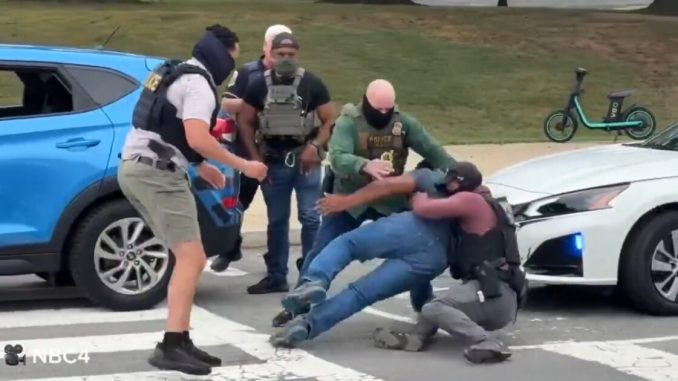
| Published August 23, 2025
Between Justice and Journalism: The Case of David Pérez-Teofani
A Viral Arrest on the National Mall
On a humid August afternoon in Washington, D.C., the National Mall—normally filled with tourists and families—became the backdrop for a scene that would quickly go viral. Federal agents wrestled a man to the ground as he screamed in protest. Cameras captured every second, and within hours, the footage of David Pérez-Teofani being taken into custody spread across social media.
For many viewers, the clip was just another moment in the nation’s heated immigration debate. But as more details surfaced, the story took a darker turn—because Pérez-Teofani was not just any undocumented immigrant. He had previously faced charges of aggravated sexual abuse of a 13-year-old girl in Virginia.
The Man Behind the Arrest
According to the Department of Homeland Security, Pérez-Teofani, a Mexican national, had entered the United States illegally three separate times. He had twice returned voluntarily to Mexico, but repeatedly reentered and ultimately violated a deportation order.
In January 2024, prosecutors in Fairfax County charged him with sexually abusing a minor. The case collapsed when the victim and her mother stopped cooperating with authorities. While the charges were dismissed, officials noted they could be reinstated if the victim chose to pursue the case.
A Journalist Steps In
Coverage of Pérez-Teofani’s arrest took an unusual turn when one journalist was seen and heard defending him in commentary surrounding the viral video. Framing him less as a criminal threat and more as a victim of aggressive immigration enforcement, the journalist’s stance added another layer of controversy.
Was this an act of advocacy for due process and immigrant rights—or a troubling defense of someone accused of one of society’s most heinous crimes?
Public Reaction
The public response was swift and divided:
-
Support for Enforcement: Many praised ICE and DHS officers for taking a repeat border violator with a disturbing criminal history off the streets. Actor Dean Cain even commented online: “Turns out he IS a criminal…”
-
Concerns About Force and Fairness: Others questioned whether the intensity of the arrest was necessary, especially in such a public place, and argued that Pérez-Teofani deserved the presumption of innocence.
-
Victim Advocacy Worries: Critics argued that journalistic defense of a man once charged with abusing a child risked sidelining the victim’s story, further discouraging minors from stepping forward in similar cases.
The Larger Debate
The case of Pérez-Teofani highlights a crossroads where immigration policy, criminal justice, and journalism ethics collide.
-
For Law Enforcement: His repeated illegal entries and past charges make him a symbol of why stricter border policies are demanded by many Americans.
-
For Journalists: The defense of such a figure tests the balance between covering state power critically and avoiding the appearance of excusing serious crimes.
-
For Society: It raises uncomfortable questions—are we more concerned about protecting individual rights, or prioritizing public safety and victims’ voices?
Perez-Teofani was accused of child sex crimes last year but the charges were dropped.NBC
“Please! I’m not a criminal! I work here! I want to be with my family!” Perez-Teofani screamed in Spanish.NBC
Perez-Teofani was accused of child sex crimes last year but the charges were dropped.NBC
“Please! I’m not a criminal! I work here! I want to be with my family!” Perez-Teofani screamed in Spanish.NBC
 Implications
Implications
1. Media Credibility & Public Trust
-
Perception of Bias: When a journalist defends an accused individual—especially one facing child sexual assault allegations—the public may see it as bias rather than objective reporting.
-
Trust Divide: Supporters of strict law-and-order measures may feel mainstream media is more sympathetic to suspects than to victims. This can deepen distrust in journalism.
-
Narrative Shaping: Even if the defense is about due process, audiences may interpret it as minimizing the seriousness of the alleged crime.
2. Victim Advocacy vs. Defendant Rights
-
Victim-Side Impact: Journalistic defense could unintentionally silence or discourage victims (especially minors) from coming forward, fearing their stories may be overshadowed by political/immigration debates.
-
Rights of the Accused: On the other hand, journalists emphasizing fair trial and presumption of innocence highlight constitutional principles—important in safeguarding justice even in sensitive cases.
3. Political & Policy Implications
-
Immigration Debate Intensified: Linking illegal immigration with child sex crimes can amplify calls for stricter border control, enforcement, and deportation policies.
-
Fuel for Partisan Division: Opponents of illegal immigration see it as validation of their stance; defenders of immigrant rights may frame coverage as scapegoating an entire group.
-
Policy Momentum: Politicians may seize on such coverage to push stricter immigration laws, sanctuary city crackdowns, or deportation initiatives.
4. Law Enforcement & Judicial System
-
Prosecutorial Challenges: Journalistic framing might add pressure on prosecutors handling sensitive cases, influencing public expectations.
-
ICE & DHS Perception: A journalist’s defense could be seen as undermining enforcement efforts, especially since Pérez-Teofani had prior deportation orders and multiple illegal reentries.
-
Due Process Reminder: Highlighting flaws in the legal process (e.g., case dismissed due to victim’s non-cooperation) can serve as a check against rushed convictions.
5. Social & Cultural Impact
-
Polarization of Public Opinion: Some may view the defense as compassion and fairness; others see it as excusing criminality.
-
Migrant Community Stigma: Such cases—when highlighted—risk generalizing one individual’s alleged crimes to immigrant communities as a whole.
-
Journalism’s Role: Raises the ethical question—should journalists defend, or simply report? The line between advocacy and reporting blurs.
⚖️ Balanced Perspective
-
For Critics: Defending an accused child sex offender (especially an undocumented immigrant with multiple reentries) risks appearing tone-deaf to victims and dismissive of public safety concerns.
-
For Supporters: Journalists may argue they are safeguarding fairness, ensuring the accused is not demonized before trial, and reminding the public that charges dismissed for lack of evidence matter legally.
 Overall Takeaway:
Overall Takeaway:
The defense of David Pérez-Teofani by a journalist underscores the delicate tension between due process and public safety in America’s immigration debate. While every accused individual has the right to legal fairness, defending an undocumented immigrant with prior deportation orders and allegations as serious as child sexual assault risks eroding public trust in journalism and shifting focus away from victims.
Ultimately, this case is not only about one man’s arrest but also about how media narratives shape national conversations on immigration, law enforcement, and justice. Journalists walk a fine line: they must hold institutions accountable without appearing to excuse alleged crimes. When that balance tips, the implications reach far beyond the courtroom—fueling political division, testing public confidence, and raising urgent questions about whose voices the media chooses to amplify.







Be the first to comment